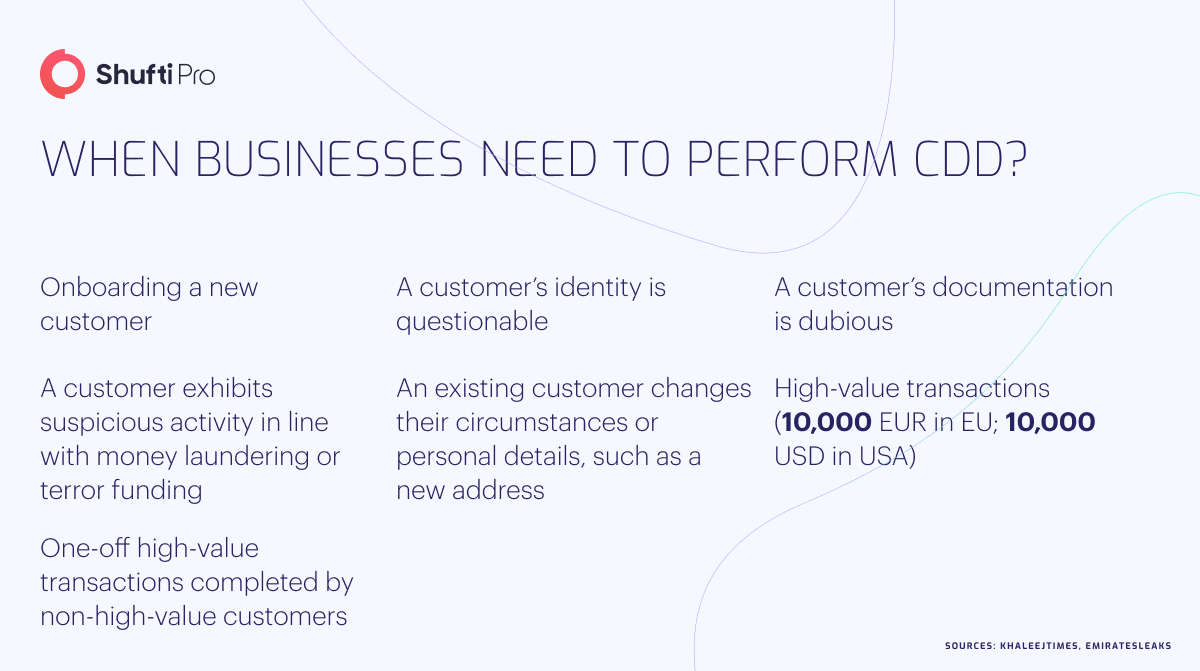5-Steps to Improve Customer Due Diligence Process

The digital age has witnessed a new wave of financial fraud. It is estimated that $4.7 trillion of corporate revenue is lost annually to scams. Worst hit by the fraud pandemic, businesses are looking for a way out. Taking the situation into account, regulators are introducing stricter Anti Money Laundering (AML) regulations and Customer Due Diligence (CDD) responsibilities.
A Bit About Customer Due Diligence
So, what is CDD? It is the process of identifying clients, verifying their identity, and tracking their behaviour to protect businesses from bad actors. An obligation upon financial firms and certain other companies, CDD helps to curb money laundering, terrorism financing, and other heinous crimes.

3 Tires of Customer Due Diligence
Although CDD is mandatory for certain institutions, it doesn’t mean every client must go through a comprehensive monitoring process. Depending on the level of risk associated with a particular customer, they either have to be the subject of Simplified Due Diligence (SDD), Standard Customer Due Diligence, or Enhanced Due Diligence (EDD).
- Simplified Due Diligence: SDD is conducted when a client poses little to no risk to the business or when the product they are applying for poses little risk. Low-risk customers are identified simply through their official documents and Personally Identifiable Information (PII).
- Standard Customer Due Diligence: CDD is performed when the customer poses a moderate risk to any business. Medium-risk profiles are verified through official documents, PII, and an official third-party identifier as per Know Your Customer (KYC) requirements.
- Enhanced Due Diligence: EDD is applied to those clients who pose a high risk to the organisation, live in high-risk jurisdictions, or are engaged in high-risk activities.
Institutions Subject to CDD Regulations
AML and due diligence procedures are considered banking regulations; however, they also apply to some non-banking firms too. Although legislation varies from country to country, businesses are seeing stringent regulations regarding which firms should have customer due diligence processes in place.
Section 352 of the US Patriot Act has amended the Banking Secrecy Act to expand the businesses that must implement due diligence processes. Previously only banks had to comply with AML regulations. Now non-financial firms such as broker-dealers are also mandated to deploy AML programs.
The United Kingdom also has stricter AML policies under ‘Money Laundering Regulations 2007’. The regulations outline sectors that must use due diligence processes:
- Money service businesses
- Accountancy service providers
- High-value dealers
- Insurers
- Telecommunications services
- Art market dealers
- Estate agency services
- Bill payment services
The fifth European Anti-Money Laundering Directive (AMLD 5) included tax-related services, art traders, virtual currency exchanges and wallets. AMLD 6 came into force in 2020, establishing business liability for money laundering.
How to Enhance Customer Due Diligence Process?
To ensure that the company follows best practices, here are the 5 steps to improve CDD in banking and other non-banking institutions.
1. Verify Customers
Performing CDD before entering into a corporate relationship with clients is the key to keeping fraudsters at bay. Clients can be verified through their name and residence; however, with an increasing number of fraudulent activities, collecting additional information like their Date of Birth (DOB), national ID card number, etc. is advisable. Checking which category of risk a customer faces is key to preventing identity theft and potential forgeries at an early stage.
2. Choose Third Parties Wisely
Businesses must rely on third parties like banks or lawyers to help them accurately and efficiently conduct due diligence procedures. The only tip is that companies must choose them wisely because, in the end, the particular firm is accountable for their CDD measures, not the third parties. The golden tip to selecting third parties is to check whether their goals align with the business.
3. Ensure Security of the Collected Data
When authenticating any customer, it is essential to classify their category before securely storing all the data digitally. Although collecting personal details is a part of due diligence in banking and other sectors, there are often tight regulations on collecting and storing information. Ensuring the security of customer data is not only a legal requirement to avoid non-compliance fines but also a necessity to maintain the business’s reputation.
4. Perform EDD in Case of High-Risk Clients
Beyond just performing basic due diligence, checking whether enhanced due diligence is necessary. This is a continuous process as any low-risk customer can turn into a high-risk profile with the passage of time. For example, many countries require Politically Exposed Persons (PEPs) to be the subject of EDD. Other factors that trigger EDD are profiles with high transaction value and adverse media mention. Enhanced due diligence protects businesses from nefarious crimes and makes them compliant with KYC/AML regulations.
5. Be Prepared for Audit
Keeping records of due diligence performed on any client is crucial for satisfying future regulatory obligations. Having digital records in place can help re-analyze any situation to decrease any risk, boost performance, and better guard against problematic profiles. These checks facilitate the auditing team to hone their methodology and otherwise optimise compliance processes.
Who Can Benefit from the CDD Checklist?
- Businesses dealing with customers
- Companies that must abide by AML regulations
- Financial or non-financial institutions that want to safeguard themselves from the risks associated with their clients
Stay CDD Compliant with Shufti
Compliance with CDD is not a checkbox exercise but the key for all forward-looking organisations. And Shufti, the leading document verification service, is the go-to option for all those firms who want to protect themselves from hefty non-compliance fines. Providing customer and business verification in less than a second, Shufti is globally trusted in protecting companies from fraudulent activities.
Are you confused about whether your business is KYC/AML compliant?

 Explore Now
Explore Now













